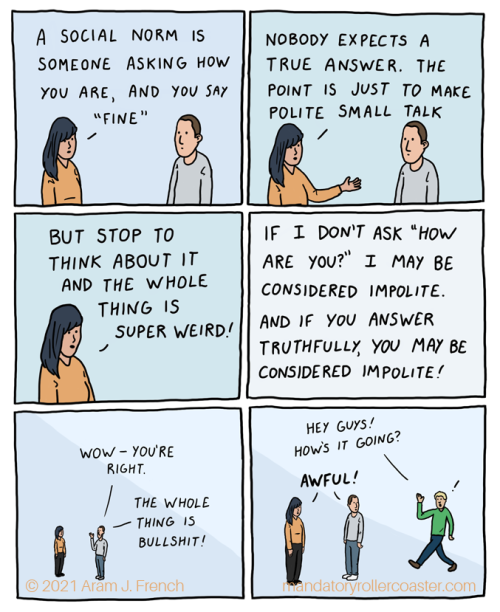#social norms
Recently Sarah Constantin wrote a taxonomy of norms for groups, breaking them into Civic, Guest, Kaizen, Coalitional, and Tribal norms, which I think is fairly good if I think struggling with the common case where people want to be fair but also not rule-based.
Kaizen norms are an interesting identified cluster; in Kaizen, there is an ideal, everyone is working towards it, and the structure of the group is based around rewarding people for progress toward it and discouraging movement away from it. Distraction is discouraged; claims of unfairness are valid not if they correctly point out inconsistent application of rules, but if they point out inconsistency in rewarding the ideal. Examples they give include competitive/meritocratic school and work environments, sports teams, and some religious groups. I would add most academic spaces- certainly it is what they want to be.
I know a lot of people who are very attracted to Kaizen-type norms and keep trying to work on spaces implementing them for ideals they care about. And I think Kaizen norms arguably are the best norms because they can encourage you towards being more like you want to be, provide reinforcement to the parts of you you want reinforcing, and be actually built in a consequentialist, goal-oriented way rather than having norms decoupled from objectives… so long as you are in perfect alignment with everyone else on what the ideal should be and what behaviours achieve it.
When you have a slight disagreement, it’s a considerable friction. When you have a disagreement of any substance, the group is intolerable to you. And from the inside view, this often just looks like “the group is dumb” so people go off and try to find a *better* space for the virtues they care about, maybe grouping up with other disgruntled people. And maybe they try again, and it still doesn’t work, or it’s perpetually in progress but never realised. And they never quite realise that it’s because they struggle to find a mere two people who actually have compatible enough ideals and strategies that they could productively operate on Kaizen norms together, let alone more.
People, I think, don’t realise how incompatible they are with everyone else on these things. They’re perpetually looking at spaces they have frictions with and thinking that they’re unusually bad rather than thinking that the target area they want is actually really really narrow. And thus we get schism after schism, and fork after fork. Programmers, trying to build Kaizen-norm spaces whose ideals are based around building software together, are pretty bad for this.
As a result, I think Kaizen norms are a great thing to try to build communities around- a space where everyone reinforces each other in getting better in some way or towards achieving some goal. But always as a place to visit, rather than a place to live, because you’re going to have friction that you will only be able to tolerate in small doses. And to visit with an expectation of compatibility issues and friction to deal with, and an awareness that you’re never going to agree perfectly with everyone else on what things constitute successfully accomplishing your ideals even if you can agree on an ideal to try to accomplish.
But in contrast, kaizen spaces clearly do exist - so what’s the difference?
Most of the clear cut examples - sports, academics, certain religious communities - have a standard of success that is clear cut and more or less immutable. You have to buy into the method of evaluation before you join the group, really.
But this seems more like a matter of degree than a clear cut difference. You could just fork a new sport or ruleset, and people do, but mostly not. So is it just that these orgs are built around succeeding at standards with much more weight behind them?
Video game communities very often fall into this pattern, and the rules there are pretty close to immutable - ruleset arguments are mostly about which game to play rather than how to play a given game.
Companies are less like this and while they are substantially more prone to schism than sports, I don’t think it’s anywhere near as bad as it is in software projects and lw stuff.
And part of it might be missing organizational skills. But I think part of it is that software communities and lw communities are not nearly as aligned on being kaizen communities as game competitive ones are.
If you’re trying to win at a sport, it’s not hard to agree that goodness at that activity is the core metric.
But like Taymon calls out in the comments, many lw adjacent discords and communities are at least nominally trying to adhere to something closer to guest norms.
I think part of the conflict you’re perceiving is between people trying to build kaizen communities, but disagreeing about what the valued measure is, against the backdrop of a civic community and a series of naturally schisming guest communities.
I think the correct answer to how these real world Kaizen spaces work is basically “heavy authoritarianism” but it isn’t very actionable. By joining the functional Kaizen spaces you delegate all judgement on what strategies work to your pastor/coach/boss and get under a lot of structural pressure to just stop second guessing them. If you can’t do that then you do burn out, but most people learn to do it temporarily. This only sort of avoids being massively unhealthy by having a separation between your life and the space, and I think if you lack that things do go downhill.
The other especially bad thing locally is that yes, the metrics are way less clear and people disagree on them more, and much more than they estimate.
Edit: Some other points of distinction:
- Trying to build Kaizen norms around real-world goals might be a serious problem for people’s willingness to delegate defining of how a strategy is accomplished to an authority.
- We lack established traditions or social scripts for authority that make for vaguely trustable authorities- not that authorities elsewhere have proven consistently trustable either.
- Maybe it’s actually an unusual trait to have such an incredibly narrow target for the kind of Kaizen spaces that work for you- the observation “people have very narrow requirements” is made based on observations of the people relatively close to me, and it could well be an idiosyncrasy of our kind that stops it cooperating.
- Schisming an actual established org is harder- I don’t think this is the only explanation though because if it was I’d expect to see everyone completely atomised, and instead we’re only almost completely atomised. There has been an utter collapse in membership in so called intermediate-level organisations between the size of “family” and “state” which actually ask anything of their members in the last century, as I understand it, which could well be “people have very narrow demands and kept leaving because schisming wasn’t practical”, but as you say, sports teams still exist so this isn’t the only thing going on.
Recently Sarah Constantin wrote a taxonomy of norms for groups, breaking them into Civic, Guest, Kaizen, Coalitional, and Tribal norms, which I think is fairly good if I think struggling with the common case where people want to be fair but also not rule-based.
Kaizen norms are an interesting identified cluster; in Kaizen, there is an ideal, everyone is working towards it, and the structure of the group is based around rewarding people for progress toward it and discouraging movement away from it. Distraction is discouraged; claims of unfairness are valid not if they correctly point out inconsistent application of rules, but if they point out inconsistency in rewarding the ideal. Examples they give include competitive/meritocratic school and work environments, sports teams, and some religious groups. I would add most academic spaces- certainly it is what they want to be.
I know a lot of people who are very attracted to Kaizen-type norms and keep trying to work on spaces implementing them for ideals they care about. And I think Kaizen norms arguably are the best norms because they can encourage you towards being more like you want to be, provide reinforcement to the parts of you you want reinforcing, and be actually built in a consequentialist, goal-oriented way rather than having norms decoupled from objectives… so long as you are in perfect alignment with everyone else on what the ideal should be and what behaviours achieve it.
When you have a slight disagreement, it’s a considerable friction. When you have a disagreement of any substance, the group is intolerable to you. And from the inside view, this often just looks like “the group is dumb” so people go off and try to find a *better* space for the virtues they care about, maybe grouping up with other disgruntled people. And maybe they try again, and it still doesn’t work, or it’s perpetually in progress but never realised. And they never quite realise that it’s because they struggle to find a mere two people who actually have compatible enough ideals and strategies that they could productively operate on Kaizen norms together, let alone more.
People, I think, don’t realise how incompatible they are with everyone else on these things. They’re perpetually looking at spaces they have frictions with and thinking that they’re unusually bad rather than thinking that the target area they want is actually really really narrow. And thus we get schism after schism, and fork after fork. Programmers, trying to build Kaizen-norm spaces whose ideals are based around building software together, are pretty bad for this.
As a result, I think Kaizen norms are a great thing to try to build communities around- a space where everyone reinforces each other in getting better in some way or towards achieving some goal. But always as a place to visit, rather than a place to live, because you’re going to have friction that you will only be able to tolerate in small doses. And to visit with an expectation of compatibility issues and friction to deal with, and an awareness that you’re never going to agree perfectly with everyone else on what things constitute successfully accomplishing your ideals even if you can agree on an ideal to try to accomplish.
i wish it was still valid to just tell people you’re “retiring for the evening”
company over at your house but someone else who lives with you invited them? gracefully exit by announcing that you’re retiring for the evening. tired at a party? about time to retire for the evening. someone asks if you want to do something at night? “oh no thanks, i’m just about to retire for the evening.” bring it back please, i need a cool and efficient way to say that i’m tired and want to exit a social situation
I have no idea how it started, but I call this “pumpkining” or I will say “well I am about to turn into a pumpkin” which essentially means that I will be falling asleep shortly, the only question is as to where(at the party, in my bed, or on the drive home) (obviously I’m not actually going to fall asleep while driving, but I will struggle to stay focused and aware)
All that to say that people understand when you say stuff like this, and will probably find it charming if you put it as phrased above.
I’m usually pretty frank: “whelp. I’m out. Have fun, everyone.”
And if anyone whines about me missing out, I usually whine back, “But I’m tiiiiiired!!!” or “To bad, ‘cause I gotta gooooooo” and then usually blow them kisses before heading out (or off to bed) anyway.
Just… do it. I would LOVE if my friends would start up “retiring for the evening” and I think OP’s social group would too. (If not, hate to say it, but OP deserves a better social group)
As I read along a romance book I noticed: all romance books I’ve read have supported the woman being small and curvy while the men are huge and practically dwarf them. Where are the books with short guys and tall girls? Need to see me some of that.
I can’t think of a single one. I’ve read some where the heights match, I’ve definitely read romance novels with tall women, but I can’t think of a single one where the hero is shorter than the heroine.
Anyone else?
As a short woman myself, I have always had a really hard time picturing a relationship with a shorter man… probably because I’ve almost never met any. But obviously that’s not the case for tall women. There is, of course, a strong cultural bias toward pairing women with men taller than themselves, but there are real-life exceptions, so you would think there would be exceptions in fiction, too.
There absolutely is a cultural bias of the men being taller - both in romance as a genre and society as a whole - and I can attest to that first hand, being 6,1". (My partner is 6,0″ and I call him “Shawty” sometimes in a T-Pain voice)
And I do feel super bummed that this idea that the man has to be bigger is so pervasive. Coming from a family of amazon women (all my closest female relatives are my height or slightly shorter) I know how deeply rooted this idea is and how intertwined it is with the idea of women not taking up much space. I can relate to plus sized heroines in that way as they often deal with the expectaion of “smallness” too.
But there is something special in seeing yourself in media and I do have a Goodreads bookshelf with tall heroines (the hero being shorter isn’t a guarantee, so I just list the heroines that are tall) and SBTB did a rec league recently on the subject, check that out too! There are some recs on this old post too!

Maybe it’s the asexual in Mr, maybe its the ex cult kid, idk but I feel like we put so much meaning on sex when we’ve essentially made it meaningless as a civilisation?
Like we don’t mate to breed? We have contraceptives and stuff. We do it because we want to. And we have IVF and cloning etc so theoretically we don’t actually need to have sex at all.
It’s a completely natural thing but we put so much meaning on it?? I get it in the past, but now? It’s meaningless. The only reason it’s still a big deal is because we keep it that way?
And I really don’t understand the logic of that







